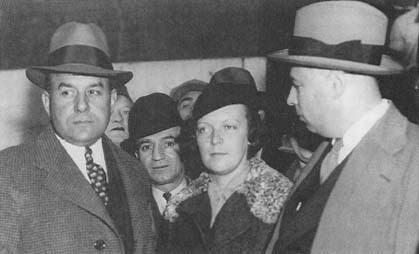Vera Stretz Trial: 1936
Vera Stretz Tells What Happened
When the trial began on March 20, 1936, defense attorney Leibowitz probed each juror's knowledge of Friedrich Wilhelm Nietzsche, the German philosopher whose idea of a super-race attracted Adolf Hitler, and who said, "Man shall be trained for war and woman for the recreation of the warrior; all else is folly." Then, with Vera Stretz on the stand for 13 hours, Leibowitz carefully produced testimony on Gebhardt's attitude toward marriage and toward her. When she announced the night of November 11 that she would not continue their relationship, she testified, Gebhardt had thrown her on the bed and raped her.
Next, laughing at her and saying, "If you want to make it the last night, you will have to make it a good one," he demanded that she perform an act of sodomy so foreign to her, and so shameful, that she had been unable to tell the police. Now she recounted it, at the insistence of Judge Cornelius Collins, only through violent, uncontrollable sobbing. Recalling seeing a gun in Gebhardt's chest of drawers when she looked for his heating pad, she seized it. The doctor, crying, "You damned whore, I will kill you," grabbed at the gun, she said. It went off. He fell on the bed, got up, lunged again at her, and she shot again.
Prosecutor Miles O'Brien cross-examined her for four fours. She killed, he insisted, in a hot fever of jealousy because Gebhardt wouldn't give up his wife for her: "She is a tigress when provoked." But he was unable to produce a single contradiction in Stretz's testimony.
 Vera Stretz (center) shown with her attorney Samuel Leibowitz (right) leaving court after her arraignment on murder charges for shooting Dr. Fritz Gebhardt.
Vera Stretz (center) shown with her attorney Samuel Leibowitz (right) leaving court after her arraignment on murder charges for shooting Dr. Fritz Gebhardt.
The judge's charge lasted five hours, defining first-degree murder, second-degree murder, first-degree manslaughter, and reasonable doubt, excusable homicide, and justifiable homicide. "If you believe her story," he finished acidly, "acquit her."
Within three hours, the jury did so. The furious judge went to his chambers without thanking the jury for its services.
The next day, Stretz met the press. "Don't let this ruin your life," said a woman reporter.
"My life is ruined already," said Vera Stretz.
Years later, the defendant in this trial was identified only as one Laura Parr. When and how her name was changed from Vera Stretz remains a secret buried with her ruined life.
—Bernard Ryan, Jr.
Suggestions for Further Reading
The New, York Times. See Stretz, Vera, in The New, York Times Index, November 12, 1935—April 4, 1936.
Reynolds, Quentin. Courtroom: The Story of Samuel S. Leibowitz. New York: Farrar, Straus and Co., 1950.
Additional topics
Law Library - American Law and Legal InformationNotable Trials and Court Cases - 1918 to 1940Vera Stretz Trial: 1936 - A Revolver And Bloodstains, Vera Stretz Tells What Happened